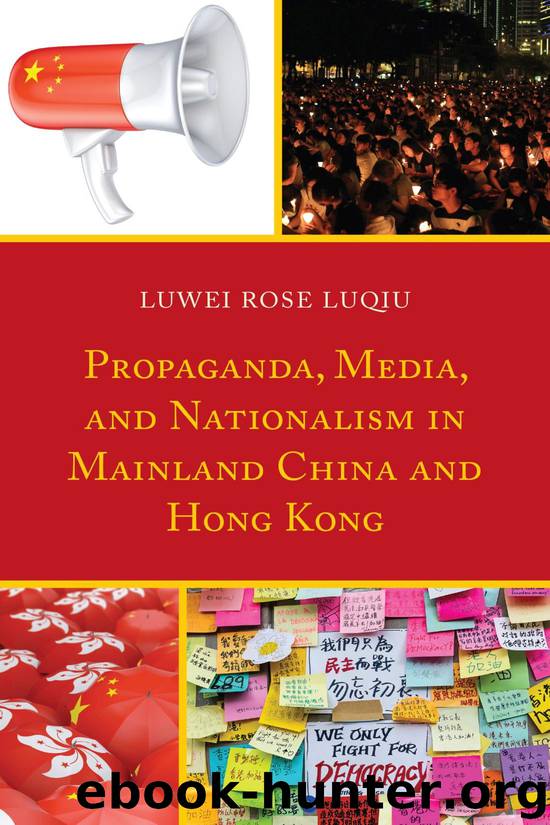Propaganda, Media, and Nationalism in Mainland China and Hong Kong by Luqiu Luwei;

Author:Luqiu, Luwei;
Language: eng
Format: epub
ISBN: 9781498573153
Publisher: Rowman & Littlefield Publishing
Conclusion
Studies show that the psychological processes that promote online and offline actions have no significant differences. The variables that are involved in modern norms of street actions are predictors that are used for certain periods of time: shared social identity, assessments of the efficacy of action, and feelings of anger and injustice (Zomeren et al., 2008). These variables can predict collective actions not only in open societies such as Hong Kong but also in authoritarian countries such as China. Before the advent of social media, on May 19, 1989, over 1 million people flooded Tiananmen Square just by word of mouth and landlines. In Hong Kong, the largest demonstrations in history occurred in 1989 and 2003, long before the Internet and social media became popular.
However, the weight of the Internet on civic engagement differs between Hong Kong and Mainland China. In the mainland, the last large-scale student movement occurred in 1989. Although there are continued sporadic clashes around the country, they are not interconnected. Unlike in Hong Kong, which has a strong political infrastructure, a social movement tradition, and an open society, mainlanders are still in the early stages of citizenship. The Internet broadens their horizons and provides a platform for them to learn how to express themselves, debate, and listen to others, which is why the CCP seeks to strengthen social control in Hong Kong and refuses to fulfill its promise of universal suffrage.
Social media enables cross-regional collective activities within Mainland China among different cities and provinces, between Mainland China and Hong Kong and even internationally. On March 8, 2015, five feminists were detained by the government and accused of interrupting public order by preparing to perform offline anti-sexual harassment activities on International Women’s Day. Although this case was not reported in the mainland, it received attention in Hong Kong. People in Hong Kong demonstrated to show their support for the release of the five girls. Their photographs were posted and disseminated through Chinese social media, and people started to ask who these girls were and why they were arrested (Wong, 2015). It was not the first time that people in Hong Kong showed their support for Chinese dissidents. The annual Tiananmen commemoration has persisted since 1989.
For the CCP, what occurs in Hong Kong might serve as an example for mainland people who would then demand their rights as citizens. Information control is fundamental to determining the stability or failure of authoritarian regimes. As the result of a sophisticated media control strategy, Chinese media contribute to the regime’s legitimacy and effective rule by providing certain information (Stockmann et al., 2011). The Chinese government has developed a formal model to keep limited media independence from leading to revolt and to permit certain information to improve governance. When it finds online discontent difficult to control, it tightens the control over traditional media and successfully discredits the bad news circulated online or reported by the independent media (Lorentzen, 2014).
Both people in Hong Kong and people in Mainland China face a difficulty: a
Download
This site does not store any files on its server. We only index and link to content provided by other sites. Please contact the content providers to delete copyright contents if any and email us, we'll remove relevant links or contents immediately.
| Anthropology | Archaeology |
| Philosophy | Politics & Government |
| Social Sciences | Sociology |
| Women's Studies |
Cecilia; Or, Memoirs of an Heiress — Volume 1 by Fanny Burney(32078)
Cecilia; Or, Memoirs of an Heiress — Volume 3 by Fanny Burney(31470)
Cecilia; Or, Memoirs of an Heiress — Volume 2 by Fanny Burney(31420)
The Great Music City by Andrea Baker(30797)
We're Going to Need More Wine by Gabrielle Union(18645)
All the Missing Girls by Megan Miranda(14796)
Pimp by Iceberg Slim(13803)
Bombshells: Glamour Girls of a Lifetime by Sullivan Steve(13701)
Fifty Shades Freed by E L James(12927)
Talking to Strangers by Malcolm Gladwell(12889)
Norse Mythology by Gaiman Neil(12862)
For the Love of Europe by Rick Steves(11559)
Crazy Rich Asians by Kevin Kwan(8900)
Mindhunter: Inside the FBI's Elite Serial Crime Unit by John E. Douglas & Mark Olshaker(8724)
The Lost Art of Listening by Michael P. Nichols(7170)
Enlightenment Now: The Case for Reason, Science, Humanism, and Progress by Steven Pinker(6881)
The Four Agreements by Don Miguel Ruiz(6328)
Bad Blood by John Carreyrou(6286)
Weapons of Math Destruction by Cathy O'Neil(5851)
